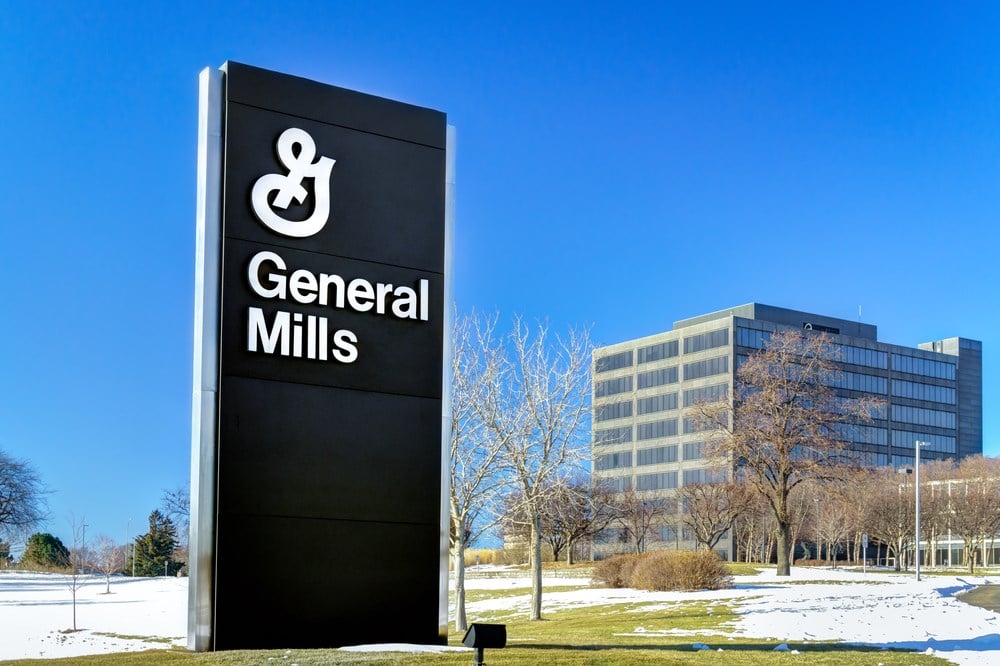
Like a soggy bowl of cereal, it’s been a forgettable summer for General Mills, Inc. (NYSE:GIS).
Since posting mixed second quarter financial results at the end of June, the packaged foods leader has seen its share price dip more than 7%. The defensive stock’s uncharacteristic downtrend has produced a three-month losing streak — and put it in danger of finishing lower this calendar year for the first time since 2018.
There are silver spoons, eh, linings.
First, the appetizer. Historically, when General Mills slumps, it recovers well. The stock’s last three-month losing streak (August 2021) was followed by a 45% run to record highs.
Second, the recent slide has pushed the forward dividend yield to 3.2%, which is well above the consumer staples sector average of 1.9%. S&P 500 peers like Kraft Heinz and Conagra are yielding more; others like McCormick and Hormel have lower income payouts. More importantly, General Mills’ recent 9% dividend hike reflects optimism in the long-term outlook and an eventual share price recovery.
Yet to snack on the increased dividend, prospective investors must take inventory of what’s gone wrong — and what may lie ahead.
What Are the Challenges Facing General Mills?
With food commodities, labor and other costs higher than they were a year ago, General Mills has been forced to raise prices. Up until the second quarter of 2023 (fiscal Q4), this drove double-digit percentage profit growth. In Q2, profits were ahead of consensus expectations but flat year-over-year.
The main issue is that sales volumes have weakened. The North American Retail, International and Pet segments all witnessed lower volume in Q2, offsetting the benefit of higher pricing. Increased prices on bakery flour dented growth in the North American Foodservice business.
General Mills is expected to pick up where it left off in fiscal 2023 with Wall Street projecting flat earnings per share (EPS) in the first quarter of fiscal 2024. The outlook gets better from there though with EPS forecast to be up 5% in both fiscal 2024 and fiscal 2025 — but why will things get better?
What Are General Mills’ Growth Opportunities?
The same thing that sank General Mills is likely to push it out of the current slump — inflation. Moderating inflation is in the early stages of helping corporate income statements, as seen in many Q2 reports.
Since General Mills is on a different reporting calendar, there will be a lag — but the positive effects should ultimately be the same. Theoretically, lower cereal, snack and frozen food prices should lead those shoppers who’ve traded down to cheaper store brands back to national brands, driving stronger sales volumes.
Nowadays, for General Mills, it's about more than Cheerios and Wheaties. The company is leaning on more product categories for growth, including ice cream, snack bars and Mexican food. Meanwhile, an increasing lineup of ‘better-for-you’ items continues to benefit from post-pandemic wellness trends.
The combination of cooling inflation and declining interest rates over the next few years should create a more normalized shopping environment for brands like Haagen-Dazs, Nature Valley and Old El Paso. General Mills is also hoping this leads to more pet owners paying up for Blue Buffalo products. Recently acquired frozen pizza crust maker TNT Crust is already making a solid contribution.
Until macroeconomic forces become more favorable, General Mills' stock may be range bound. But if the company returns to profit growth as anticipated, buyers will return. Especially with the elevated dividend, this means the stock may not trade at a discount to packaged foods peers for long.
At 16x trailing 12 months earnings, General Mills is the second cheapest out of a dozen S&P 500 packaged foods & meat stocks. Only Tyson Foods at 14x is less expensive. Rival Kellogg has a trailing P/E ratio of 27x.
If General Mills rebounds 8% as the average Wall Street price target suggests, it would generate an 11.5% return over the next year, including the dividend. Over the last 10 years, the investment has produced an annualized total return of 6.1%. So with GIS down 11% year-to-date, a reversion to the mean could freshen up this surprisingly soggy stock.














